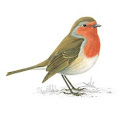You know that feeling of finding a passage or a description in a book and thinking "that is so me," or "that is so true"?
I had that feeling some time ago, when I was reading Ian McEwan's Enduring Love. I'm a big McEwan fan lately; he's quite brilliant on the subtle motivations, emotions, desires and fears that go into any human interaction. The moment that flashed out at me this time was about anger, the psychology of arguing.
Mid-way through the book, a couple have an argument, a serious one, compounded by both coming home after a terrible day and neither being able to give or receive what they need from the other. Their attitudes towards arguing are described:
"She is especially bad at arguments. She has never been able to accept the rules of engagement which permit or require you to say things that you do not mean, or are distorted truths, or not true at all. She can't help but feeling that every hostile utterance of hers takes her further not only from Joe's love, but from all the love she's ever had, and makes her feel that a buried meanness has been exposed that truly represents her."
"His emotions are slow to shift to anger in the first place, and even when they have, he has the wrong kind of intelligence, he forgets his lines and cannot score the points. Nor can he break the the habit of responding to an accusation with a detailed, reasoned answer, instead of coming back with an accusation of his own. He is easily outmanoeuvred by a sudden irrelevance."
The funny thing is that I saw myself in both descriptions: the cost of uttering untruths or accusations seems far too much to bear (in that it breaks down a relationship that I value, in that I can't stand for anyone not to like me, and in that it might reveal how mean I really am); but I am also horrible at verbal repartee and always feel myself floundering in the flow of an intense conversation, trying to respond to one point when another one has already taken its place.
Friends have asked me, Don't you ever get angry? The answer is that I get angry, like anyone else, but I can't really remember ever having arguments or fights, those of the screaming match and slammed-door variety (mom, am I blocking out anything from the teen years?). When I do get angry, I almost always find it easy to get over on my own, or else bottle it up pretty successfully. I'm far more likely to cry than to yell. So even getting to the point of an argument is hard, and when there, the reasons described in McEwan's book prevent me from being a "good" arguer.
So, what books have given you a "that's me" moment?
15 June 2007
Ire
thoughts thunk by
Robin
at around
11:25
![]()
phylum or species: Books, Demagoguery, Me
Subscribe to:
Post Comments (Atom)

No comments:
Post a Comment